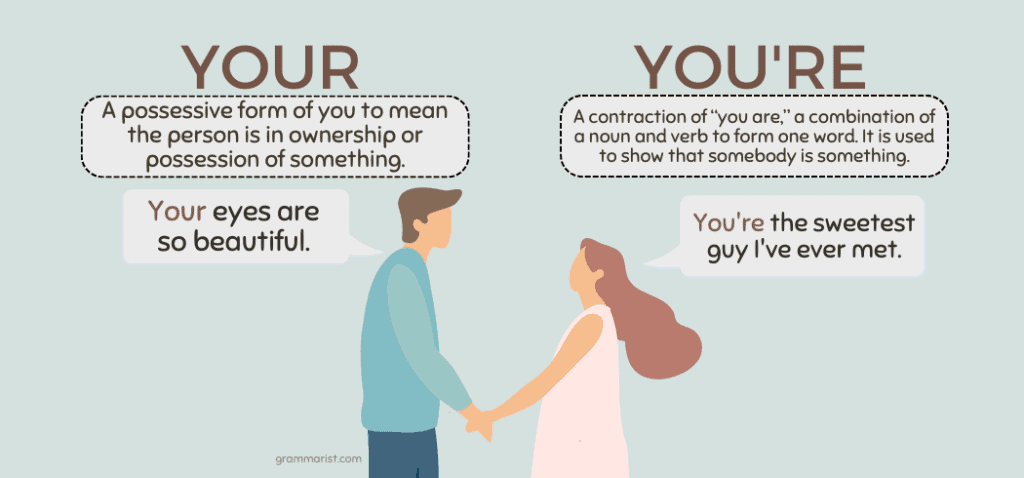Confusing the words your and you’re in writing is a common problem for native English speakers and learners alike. The exact sound and similar spelling define them as homophones, words that sound the same but have different meanings.
Despite their similarities, their misuse runs rampant, with one often being confused with the other. Obviously, this mistake is not “heard” and is not an issue in speech, but in writing, it can create a bit of a mess.
Your and you’re mean very different things, so their proper use is important. Let’s take a closer look at how they are defined and how to remember which is which so you don’t confuse or frustrate your readers.
What’s the Difference Between Your and You’re?

The words your and you’re are personal pronoun forms of the second-person point of view. Point of view refers to the position a person views a matter or situation. The second-person point of view belongs to the person, or people, being addressed. The perspective is “you” and includes you, your, yours, yourself, and yourselves.
Your is a possessive form of you to mean the person is in ownership or possession of something. You’re is a contraction of “you are,” a combination of a noun and verb to form one word. It is used to show that somebody is something.
Meaning and Use of Your
Your is the second-person possessive adjective form of you. It functions as an adjective, usually placed before the noun it modifies. For example, in the phrase “your books,” your is an adjective modifying the noun books to mean the person you are speaking to owns or is in possession of the books.
For example:
- I don’t know what you want me to do since this is your project, not mine.
- Your homework will be posted each morning in the online form.
- During the application process, your counselor will provide a step-by-step guide for you to follow.
- Please read the directions to see when you need to schedule your class presentations.
- Be sure to bring your library card with you so you can check out the books you want.
Meaning and Use of You’re
You’re is a contraction of “you are” and combines both a subject and an action into one word. It can be placed anywhere you would write or say “you are.” For example, if you were to tell somebody, “you are pretty,” is the same as “you’re pretty.”
For example:
- You’re not going to eat that sushi roll, are you?
- It doesn’t matter where you’re going to college as long as it has the degree you want to pursue.
- I’m so glad you’re enrolling in art class again.
- Since you’re feeling better, I thought we could go to the movies this evening.
- I can tell you’re not sure about your new job.
Ways to Help You Remember
When you struggle to remember whether to use your or you’re, remember the following:
- If you can replace you’re with “you are,” and it still makes sense, you have used the correct word.
Your Really Attractive vs. You’re Really Attractive
Let’s use this commonly confused phrase to help remember how to use your and you’re.
- Incorrect: She glanced at him, exclaiming quietly, “Your really attractive.”
- Correct: She glanced at him, exclaiming quietly, “You’re really attractive.”
If you replace you’re in the correct sentence, you get,
- She glanced at him, exclaiming quietly, “You are really attractive.”
Let’s Review
Your and you’re are both forms of the second-person personal pronoun you. Your is possessive, while you’re is a contraction of “you are.”
They are commonly misused in writing, which often leads to confusing grammatical scenarios. To help you remember how to double-check whether you have used the correct form, try replacing you’re with “you are,” and if it makes sense, you have used it correctly.
To help you become more familiar with the words, use our practice exercises below.
Comments are closed.